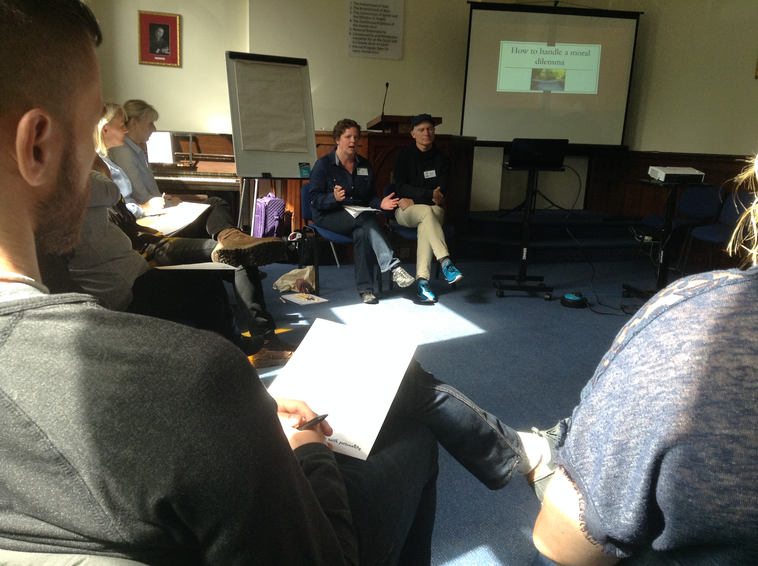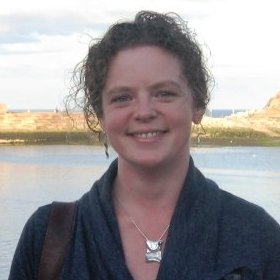
Eighteen participants from Scotland and Ireland met with Nicola Boyce and Soren Kayser who led a workshop about handling moral dilemmas in practice. The day started with an introduction about SPPA and the topic followed by the discussion about moral dilemmas.
Below is a reflection of the content of the day.
Many challenges occur on a daily basis in social pedagogical practice but not all of them are moral dilemmas. In a moral dilemma there are two mutually exclusive actions and you have a moral obligation to act. Moreover, one obligation does not outweigh the other. When addressing moral dilemmas pertinent questions provide a framework:
1. Is it really a moral dilemma? Opening up a reflective space to check the problem meets the criteria of a moral dilemma.
2. What are the rationales and importance of each option open to practitioners?
3. Check if there's a social pedagogical 'third' option?
4. If you still have to choose between two options, ask yourself 'could I accept the actions and its consequences if I were in his or her shoes?'
5. Check if there are new options opened up along the way? Many apparently intractable moral dilemmas do find a solution.
Participants brought their own moral dilemmas and this was discussed.
SPPA in Scotland meeting
Towards the end of the day, Claire facilitated a discussion to shape the future of SPPA in Scotland. SPPA helped generate much enthusiasm for a higher profile for social pedagogy in Scotland. We will be reporting on their next steps in future editions of the newsletter.
Photos
Have a look at some of the photos taken of the day.
A full day course for anyone who works with, or volunteers in, any aspect of social care or education with children or adults, and who experiences professional moral dilemmas. The speakers will work with a variety of methods, including presentations, discussions and reflection in groups.
Moral dilemmas are daily challenges in social pedagogy. Soren and Nicola will introduce a reflection model designed to handle moral dilemmas, and you will get a chance to apply it, reflecting on your own moral dilemmas.
In this course you will:
•Learn a model of reflection for moral dilemmas
•Reflect in groups on moral dilemmas from your own practice
•Learn about the philosophical ethics behind the model
•Discuss important values in social pedagogy
•Learn about the values in social pedagogical practice
After the course you’ll will be able to reflect on moral dilemmas in a way that will lead to ethically grounded and pedagogically tenable ways of action.
Speakers
SØREN KAYSER has a master in philosophy. He has a long-standing experience from different positions in the field of social pedagogy – as a practitioner working with people with multiple impairments, as a consultant working in projects supporting social relations and as a development consultant. He has both been working in the disability field and in social psychiatry.
Alongside Søren has been teaching and facilitating workshops, for a large part on moral dilemmas in social pedagogy and in 2005 he wrote the book ‘On the other hand – ethics, dilemmas and care’ (only available in Danish). The book presents a model of reflection on moral dilemmas.
He is at present teaching at University College Capital in Copenhagen, department of social education, where he largely teaches students that are specializing in social pedagogy.

Nicola Boyce is social pedagogy trainer for St Christopher’s Fellowship, a charity which provides fostering, residential and support services for children and young people. Her background is in residential child care where she became involved with developing social pedagogy at Essex County Council, doing participatory action research with children and staff to explore their experiences of social pedagogy in practice. She joined St Christopher’s in 2012 to open a new children’s home based on social pedagogic principles and in her current role provides training to staff and leads on strategic organisational development work to embed social pedagogy systemically.
Nicola has a keen interest in the relationship between theory and the complex, messy realities of relational practice with adolescents and their families, particularly those labelled most “challenging” or “hard to reach”. She has particular expertise in social pedagogy in practice with young people who have experienced abuse, trauma, mental health issues and sexual exploitation and is a passionate advocate for ethical, empowerment-based practice.
